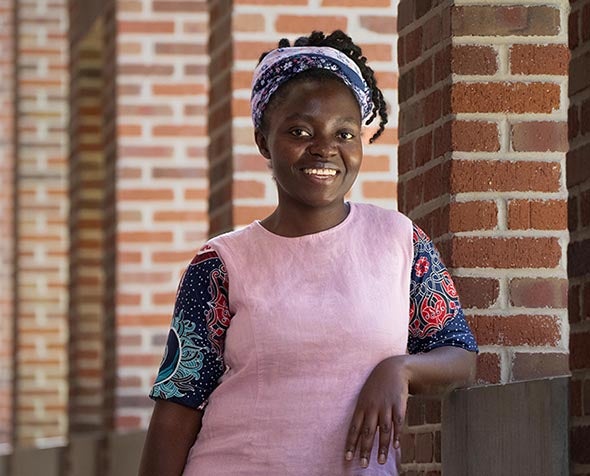From Chaos to Creativity: One Teacher’s Path to a Writing Degree
Former high school teacher and lifelong writer Ellie Moran finds her perfect fit in the Professional Creative Nonfiction Writing program at University College.

Ellie Moran will never forget the day she decided to go to graduate school.
It was the fall of 2021, and she was in her classroom at Denver’s East High School, where she taught English. Suddenly, the school was placed on lockdown, and Ellie was stuck with her rowdiest class of seniors, waiting for two hours while a dozen police officers, a SWAT team and bomb-sniffing dogs went through the building.
“And I said to myself, that’s it, I’ve got to go to grad school. That was quite literally the moment I decided. I went home that day and applied to DU,” she says.
Ellie had been teaching at East, her alma mater, for five years—an experience she calls both “delightful” and “tumultuous.” She loved her students, her colleagues and the field of education, but the pressures of being a teacher were too much—and not just because of lockdowns.
“I was only in my fifth year, and I felt like I was drowning, like I didn’t have the brain space or capacity to learn or be creative,” she says. The curriculum she taught had started to feel monotonous, and she wanted to spend more time writing.
As an undergraduate, she double majored in creative writing and secondary education at the University of Colorado Boulder. A couple years into her job at East, she decided to get a master’s degree in curriculum and instruction but, just before she was set to start the program, she had an “aha” moment.
“I was walking to a coffee shop and, I don’t know why, but I just asked myself, ‘Why are you going to grad school?’ And the only answer I had was to make more money. And I was like, ‘What?’ I can’t do something I’m not passionate about,” Ellie says. That afternoon, she says, she deferred her enrollment and removed herself from the pool completely about a week later.
'I have to write every day'
She realized that writing was what she wanted to do. “It’s like survival to me. I don’t know how to navigate the world without it,” Ellie says. “I have to write every day. I observe so many things in a day, there’s so many things in [my head], that I have to expel them.”
In the fall of 2022, Ellie enrolled in University College’s Professional Creative Nonfiction Writing program, which she says is a perfect fit for the memoir style of writing she enjoys most. “I have the memory of an elephant. I remember everything and enjoy writing about the things I remember,” she explains. “I don’t necessarily enjoy writing about things that haven’t happened.”
The creativity comes in, she says, by embedding her nonfiction with poetry and figurative language or adding images and “kind of just visually playing around” on the page.
“It feels like weaving, weaving creativity into the truth. It’s essentially making your personal story universal, taking the stories I see in my everyday life and pulling out the universal truths,” she says.
Now working as an enrichment coordinator for a Montessori academy in Denver, Ellie says her long-term goal is to get into publishing. The University College program, she says, was an easy choice because of its flexible schedule and virtual option.
“There are times where I’ve been wildly overwhelmed—because it’s grad school—but for the most part, it’s been really accessible, which I’m so thankful for,” she says.
That accessibility has allowed her to zero in on her writing. “I know how to write, but I wanted to get better. I wanted professors to look at my work and say, ‘That’s terrible’ or ‘That makes no sense.’ I wanted to learn how to structure my writing better, to work on the process.”
One of her main writing outlets is a SubStack she started last year called Mis(s) Education. She writes narrative nonfiction essays on the state of education, including topics like school shootings (including one at East High School in 2023), teacher burnout and the “epidemic of ego” in educational leadership.
She plans to continue combining her love of writing and her love of education when she moves to New York City in the fall. She has applied to several publishing houses but is also applying to some schools and community colleges for non-classroom positions in areas like student engagement and community event planning.
“The biggest thing that I've learned is that you can’t change a system while you're in it. Teachers are too tired to write about their experiences. I want to have the time to, on their behalf, talk to them, take their words, write them down and get them out there.”











